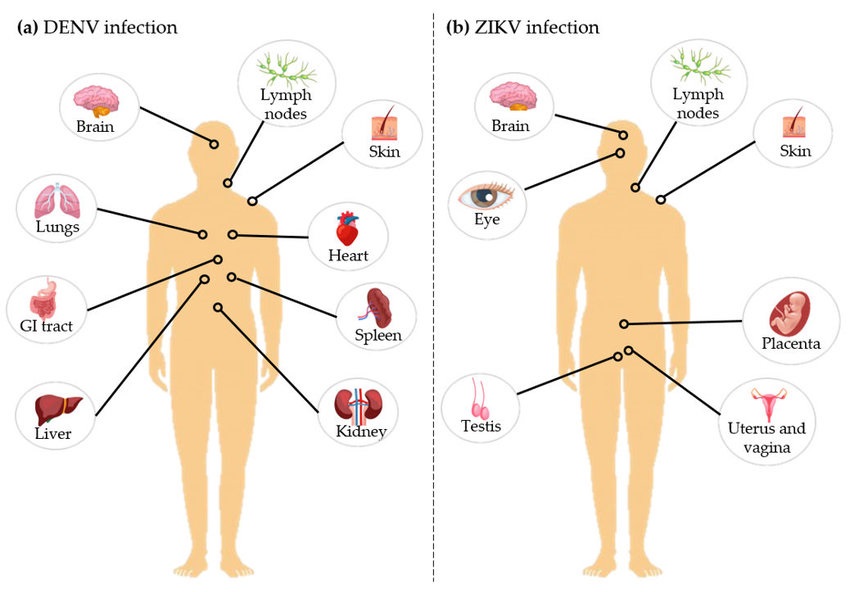Thailand Medical Experts Warns That Rainy Season Is Causing A Surge In Dengue And Zika Virus Infections Across Thailand
Thailand Medical News Team Aug 27, 2023 1 year, 7 months, 2 weeks, 6 days, 9 hours ago
Thailand Medical: The rain season in Thailand has caused the country to deal with a concerning uptick in cases of both Dengue fever and Zika virus infections, both of which are mosquito-borne disease. Health authorities have sounded the alarm since last month, urging immediate action to prevent the potential escalation of these mosquito-borne diseases. As the nation grapples with the ongoing COVID-19 pandemic and increased mobility, the conditions have become ripe for these diseases to spread and wreak havoc. The Department of Disease Control (DDC) in Thailand has issued grave warnings numerous times about the situation, emphasizing the need for awareness, prevention, and prompt medical intervention.
 Dengue Fever on the Rise: A Looming Outbreak
Dengue Fever on the Rise: A Looming Outbreak
Dengue fever, a debilitating and potentially fatal disease, is rapidly spreading across Thailand. The figures projected by the Department of Disease Control are alarming; up to 150,000 cases could be reported by the end of the year if preventive measures falter. The dengue virus, which is transmitted by Aedes mosquitoes, has historically affected children the most. However, this pattern is changing, with adults and older individuals falling prey to the disease. This shift in demographics might be attributed to a lack of immunity in these age groups.
Various health authorities and
Thailand Medical experts in Thailand have been warning about the gravity of the situation. They highlighted the urbanization of dengue infections, explaining that increased mobility among people as a result of COVID-19 easings have heightened their vulnerability. With urban areas witnessing a surge in cases, immediate action is necessary. Experts implored that individuals are to seek medical attention at the earliest signs of potential dengue symptoms, emphasizing the potential to save lives through early detection and proper screening.
Despite the urgency, many experts are cautioning against rushing into mass deployment of the dengue vaccine, citing the need for comprehensive academic support and research before such a decision is made.
Zika Virus Resurgence: A Growing Concern
In tandem with the dengue outbreak, Thailand is also grappling with the resurgence of Zika virus infections. As of now, 110 individuals have been infected with the mosquito-borne virus since the beginning of the year. The figures have risen steadily since May, indicating an escalating challenge. Zika virus infections can pose severe risks, particularly for pregnant women, leading to potential miscarriages or birth defects, such as microcephaly. Due to difficulties in surveillance, actual infection rates could be much higher. Already numerous foreign health ministries and media have reported about tourists contracting Zika virus as a result of their stay in Thailand.
https://www.thailandmedical.news/news/breaking-zika-virus-news-hungary-authorities-report-that-two-individuals-returning-after-a-holiday-trip-to-thailand-test-positive-for-zika-virus
Local health authorities have al
ready emphasized the nationwide spread of Zika infections. This spread, often coinciding with dengue fever outbreaks, is a double-edged threat to public health. To combat this menace, provincial health offices have been directed to conduct thorough health screenings, especially among pregnant women displaying any potential symptoms.
The impact of Zika on child development is equally alarming. Cases of miscarriages, microcephaly, and developmental abnormalities have been documented, underscoring the urgent need for surveillance, prevention, and research to contain this evolving public health challenge.
Local Hotspots and Ominous Trends
Certain regions in Thailand are bearing the brunt of these outbreaks. Chiang Mai, in particular, is experiencing a staggering surge in dengue cases. The numbers have skyrocketed from 1,000 cases last year to nearly 5,000 this year. The situation has prompted concerns of an impending outbreak, prompting the Chiang Mai Provincial Administration Organization to consider implementing the Communicable Diseases Act.

The Mueang district in Chiang Mai is a key area of concern. If the number of dengue cases does not show a decline by the end of the month, authorities are prepared to declare it an outbreak area. This would necessitate stringent measures to contain the spread and protect the population.
The Road Ahead: Vigilance and Collaboration
As Thailand grapples with these dual health crises, the road ahead requires a united front against these mosquito-borne diseases. Public awareness campaigns, early detection efforts, and rigorous mosquito control measures are paramount. Authorities, healthcare professionals, and the public must collaborate to eliminate breeding grounds for mosquitoes, use proper preventive measures, and seek medical attention at the first sign of symptoms.
The lessons learned from the COVID-19 pandemic underscore the importance of early action and cooperation. By heeding the warnings and taking proactive steps, Thailand can mitigate the impact of these outbreaks, protect vulnerable populations, and pave the way for a healthier future. Through academic rigor, social support, and a commitment to public health, Thailand can overcome these challenges and emerge stronger in the face of emerging infectious diseases.
For the latest on the Dengue and Zika virus situation in the Thailand, keep on logging to
Thailand Medical News.

